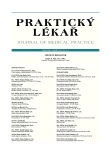-
Medical journals
- Career
Measuring older peoples attitudes to ageing
Authors: R. Bužgová; H. Klechová
Authors‘ workplace: Ostravská univerzita v Ostravě, Lékařská fakulta, Děkan: doc. MUDr. Arnošt Martínek, CSc., Ústav ošetřovatelství a porodní asistence, Vedoucí: doc. PhDr. Darja Jarošová, PhD.
Published in: Prakt. Lék. 2011; 91(7): 396-401
Category: Of different specialties
Overview
Positive attitudes of the elderly to older age and aging may affect their successful adaptation to aging and increase the life satisfaction of seniors. The aim of this research was to determine attitudes of the elderly to aging and to compare whether they are affected by
– gender,
– age,
– marital status, and
– level of self-sufficiency.
The research sample consisted of 151 seniors from the Bruntal district. For the data collection, a WHO standardized questionnaire was used to measure attitudes to older age and aging: the AAQ (Attitudes Toward Aging Questionnaire) that assesses attitudes in three areas:
1. psychosocial loss,
2. physical changes, and
3. psychological growth.
The Barthel index of basic everyday activities (ADL) was used to evaluate the degree of independence.
Older people rated making new friendships the hardest, whilst tolerance towards each other and aging were considered harder than they thought.
On the contrary, they positively evaluated the significance of life in old age, exercise in old age and integration into society. Older people in institutional care negatively evaluated their position in the area of psychosocial loss (experience of loneliness, social exclusion, closure and gradual loss of physical independence) compared to older people living at home. In this area, significantly more positive attitudes were detected in married seniors than in widowed elderly. With increasing age, the elderly had more negative attitudes. In the area of physical changes, statistically significant differences were found between older people dependent and independent on care according to the ADL test. Understanding the experiences of older people in the area of ageing can be the basis for working with elderly people.Key words:
seniors, ageing, self-sufficiency, psychological growth, physical changes, psychosocial losses.
Sources
1. Dragomírecká, E., Prajsová, J. WHOQOL-OLD – příručka pro uživatele české verze dotazníku Světové zdravotnické organizacae pro měření kvality života ve vyšším věku. Psychiatrické centrum Praha, 2009, 72 s.
2. Haškovcová, H. Fenomén stáří. 2. vyd. Praha: Havlíček Brain Team, 2010, 365 s.
3. Chachamovich, E., Fleck, M.P., Trentini, C.M., et al. Development and validation of the Brazilian vision of the Attitudes to Aging Questionnaire (AAQ): An example of merging classical psychometric theory and the Rasch measurement model. Health Qual Life Outcomes, 2008, 6(5). Published online 2008 January 21. doi: 10.1186/1477-7525-6-5.
4. Křivohlavý, J. Psychologie nemoci. 1. vyd. Praha: Grada, 2002, 198 s.
5. Laidlaw, K., Power, M., Schmidt, S. et al. The attitudes to ageing questionnaire (AAQ): development and psychometric properties. Int. J. Psychiatry, 2007, 22(4), p. 367-379.
6. Lawton, M.P. The Philadelphia Geriatric Center Morale Scale: a revision. J. Gerontol, 1975, 30(1), p. 85-89.
7. Malíková, E. Péče o seniory v pobytových sociálních zařízeních. 1. vyd. Praha: Galén, 2011. 327 s.
8. Špatenková, N. a kol. Krize psychologický a sociologický fenomén. 1. vyd. Praha: Grada, 2004. 129 s.
9. Quinn, K.M., Laidlaw, K., Murray, L.K. Older peoples’attitudes to mental illness. Clin. Psychol. Psychother. 2009, 16, p. 33-45.
Labels
General practitioner for children and adolescents General practitioner for adults
Article was published inGeneral Practitioner

2011 Issue 7-
All articles in this issue
- Cystic tumours of the pancreas – an up-to-date review
- Prenatal diagnostics of the most frequent chromosomal aberrations
- Measuring older peoples attitudes to ageing
- Assessment of compensation for pain and worsening of social assertion
- Acute endoscopic treatment of upper gastrointestinal bleeding: twenty-one-years experience
- Caregiver role strain from the view of home care nurses
- Current possibilities of publishing the results of nursing research
- Lapatinib in the treatment of advanced breast cancer
- Nasal-specific provocation test in diagnosis of occupational allergic rhinitis
-
Basics of cognitive, affective and social neuroscience:
VII. Lying - The health risk of an excessive intake of fructose
- General Practitioner
- Journal archive
- Current issue
- Online only
- About the journal
Most read in this issue- Cystic tumours of the pancreas – an up-to-date review
- Prenatal diagnostics of the most frequent chromosomal aberrations
- Acute endoscopic treatment of upper gastrointestinal bleeding: twenty-one-years experience
- The health risk of an excessive intake of fructose
Login#ADS_BOTTOM_SCRIPTS#Forgotten passwordEnter the email address that you registered with. We will send you instructions on how to set a new password.
- Career

